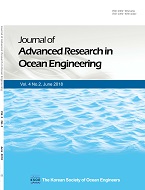
- P-ISSN2384-1052
- E-ISSN2384-1060
- Frequency Quarterly
- PublisherJournal of Advanced Research in Ocean Engineering
- Indexed by
You can use ACOMS+ service with an AccessON integrated member account.
※ If you are already an AccessON integrated member, go back to the journal’s website and login.
